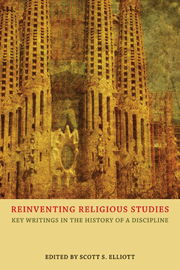Book contents
- Frontmatter
- Contents
- Introduction
- 1 For such a time as this: the Council of Societies for the Study of Religion, 1969–2009
- Part I Inventing and reinventing the field of religious studies
- Part II Method and theory in religious studies
- Part III Teaching religion
- Part IV Women and the bible in religious studies
- Part V Religion and religious studies in civic life
- 24 Contemporary socio-political change and the work of religious studies
- 25 The scholar of religion as a cultural critic: perspectives from Denmark
- 26 What are the humanities and why do they matter? The case of religion and public life
- 27 Response to Gary Lease's “What are the humanities, and why do they matter?”
- 28 So, what are we professing here? Religion, the liberal arts, and civic life
- 29 Response to Raymond B. Williams's “So, what are we professing here? Religion, the liberal arts, and civic life”
- 30 Response to Raymond B. Williams's “So, what are we professing here? Religion, the liberal arts, and civic life”
- 31 Response to Raymond B. Williams's “So, what are we professing here? Religion, the liberal arts, and civic life”
- 32 Rejoinder
- Part VI Religious studies and identity politics
- Part VII Islam and 9/11
- Bibliography
- Acknowledgments
- Index
26 - What are the humanities and why do they matter? The case of religion and public life
from Part V - Religion and religious studies in civic life
- Frontmatter
- Contents
- Introduction
- 1 For such a time as this: the Council of Societies for the Study of Religion, 1969–2009
- Part I Inventing and reinventing the field of religious studies
- Part II Method and theory in religious studies
- Part III Teaching religion
- Part IV Women and the bible in religious studies
- Part V Religion and religious studies in civic life
- 24 Contemporary socio-political change and the work of religious studies
- 25 The scholar of religion as a cultural critic: perspectives from Denmark
- 26 What are the humanities and why do they matter? The case of religion and public life
- 27 Response to Gary Lease's “What are the humanities, and why do they matter?”
- 28 So, what are we professing here? Religion, the liberal arts, and civic life
- 29 Response to Raymond B. Williams's “So, what are we professing here? Religion, the liberal arts, and civic life”
- 30 Response to Raymond B. Williams's “So, what are we professing here? Religion, the liberal arts, and civic life”
- 31 Response to Raymond B. Williams's “So, what are we professing here? Religion, the liberal arts, and civic life”
- 32 Rejoinder
- Part VI Religious studies and identity politics
- Part VII Islam and 9/11
- Bibliography
- Acknowledgments
- Index
Summary
There is deep concern throughout the United States and many other Western societies about the role, the influence, indeed even the survival of the so-called “humanities.” Some would call this situation a “crisis.” At many universities, Centers for Humanities are probing the causes and extent of the decline of humanities. Stanford University, for example, is pursuing a series of symposia this year on the shape of the humanities; chief among these events will be a weekend dedicated to the theme of whether the humanistic disciplines have collapsed. Prominent essayists question what the academy itself is there for? Fund-raising for higher education has concentrated more and more on the so-called “natural” sciences where the “product” of investment is more tangible and visible.
Closer to home, as early as 1987, under the leadership of President Emeritus David Gardner and the direction of then-Dean of Humanities Stanley Chodorow (San Diego, later Provost at the University of Pennsylvania), the University of California launched a million dollar “Humanities Initiative” Over the intervening years and with the oversight of the President's Advisory Committee for Research in the Humanities, UC has nurtured programs of faculty research fellowships (President's Fellowships); graduate student support (Graduate Student Fellowships); state, national, and international research projects (Humanities Research Institute at UC Irvine), and campus centers for humanities research and advancement (at eight of UC's nine campuses).
- Type
- Chapter
- Information
- Reinventing Religious StudiesKey Writings in the History of a Discipline, pp. 168 - 178Publisher: Acumen PublishingPrint publication year: 2013



